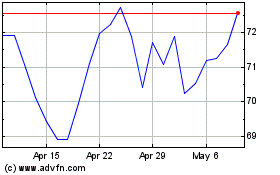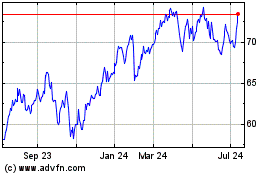Prudential, Following Rivals, Cuts Back On Long-Term Care
March 07 2012 - 4:04PM
Dow Jones News
Prudential Financial Inc. (PRU) on Wednesday became the latest
big insurer to cut back on sales of long-term-care insurance, a
type of policy that helps consumers pay for nursing-home bills and
other costly expenses but is one of the toughest business lines for
turning a profit amid ultralow interest rates.
Prudential said it would quit taking applications for policies
sold to individuals as of March 30, but would continue to sell the
coverage through employer-sponsored benefit programs.
The Newark, N.J., insurer's decision comes on the heels of an
announcement last month by Unum Group (UNM), another major seller
of insurance to employers, that it would discontinue selling
long-term-care coverage to those corporate customers. In late 2010,
giant MetLife Inc. (MET) said it was halting sales of the
coverage.
Malcolm Cheung, a Prudential executive, said the decision to
quit sales of the policies to individuals "reflects the challenging
economics of the individual market and our desire to focus
resources and capital on the group market where we see the greatest
opportunity."
Prudential said it would honor existing policies and contract
terms so long as premiums are paid on time. Those premiums can
change subject to regulatory approval.
Over the past 25 years as the coverage gained popularity, it has
proven tricky for insurers. Many have had to repeatedly seek
approval from state insurance departments for price increases to
offset costs they didn't anticipate. Policyholders are living
longer and generating more in claims than initially projected,
industry participants said.
Now, ultralow interest rates are hurting insurers' investment
returns, making it even harder to earn a profit on the
policies.
"It's extremely regrettable because Prudential was a significant
player [selling to individuals] in the long-term-care marketplace,
but it's one more casualty of the historic low interest rate
environment that nobody sees abating at any time," said Jesse
Slome, executive director of the American Association for Long-Term
Care Insurance, a trade organization supported by the agents and
brokers who sell the product.
Low interest rates play a big role because people buy the
policies often when they are in their 50s or 60s, but might not
file for claims for decades. Insurers price the product with the
expectation they will earn substantial investment income, primarily
in high-quality bonds, in the intervening years.
Slome said one of the trickiest elements for insurers to handle
amid low interest rates is inflation protection for consumers,
which many want to make sure the policies will cover the rising
cost of nursing-home care.
The shrunken market still includes about 10 major insurers
selling to individuals, and a number of large ones, besides
Prudential, continue to sell coverage to employer programs, he
said.
In retreating from the market, Unum cited factors including "the
significant decline in long-term interest rates," and said it also
considered a fresh industry study showing that lower termination
rates than the company had previously assumed were beginning to
emerge in the industry.
MetLife (NYSE:MET)
Historical Stock Chart
From May 2024 to Jun 2024

MetLife (NYSE:MET)
Historical Stock Chart
From Jun 2023 to Jun 2024
